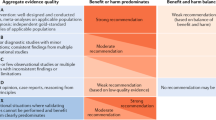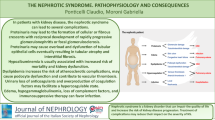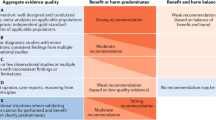Abstract
Background
ADCK4-related glomerulopathy is an important differential diagnosis in adolescents with steroid-resistant nephrotic syndrome (SRNS) and/or chronic kidney disease (CKD) of unknown origin. We screened adolescent patients to determine the frequency of ADCK4 mutation and the efficacy of early CoQ10 administration.
Methods
A total of 146 index patients aged 10–18 years, with newly diagnosed non-nephrotic proteinuria, nephrotic syndrome, or chronic renal failure and end-stage kidney disease (ESKD) of unknown etiology were screened for ADCK4 mutation.
Results
Twenty-eight individuals with bi-allelic mutation from 11 families were identified. Median age at diagnosis was 12.4 (interquartile range [IQR] 8.04–19.7) years. Upon first admission, all patients had albuminuria and 18 had CKD (6 ESKD). Eight were diagnosed either through the screening of family members following index case identification or during genetic investigation of proteinuria in an individual with a history of a transplanted sibling. Median age of these 8 patients was 21.5 (range 4.4–39) years. CoQ10 supplementation was administered following genetic diagnosis. Median estimated glomerular filtration rate (eGFR) just before CoQ10 administration was 140 (IQR 117–155) ml/min/1.73m2, proteinuria was 1,008 (IQR 281–1,567) mg/m2/day. After a median follow-up of 11.5 (range 4–21) months following CoQ10 administration, proteinuria was significantly decreased (median 363 [IQR 175–561] mg/m2/day, P=0.025), whereas eGFR was preserved (median 137 [IQR 113–158] ml/min/1.73m2, P=0.61).
Conclusions
ADCK4 mutations are one of the most common causes of adolescent-onset albuminuria and/or CKD of unknown etiology in Turkey. CoQ10 supplementation appears efficacious at reducing proteinuria, and may thereby be renoprotective.

Similar content being viewed by others
References
Eddy AA, Symons JM (2003) Nephrotic syndrome in childhood. Lancet 362:629–639
Smith JM, Stablein DM, Munoz R, Hebert D, McDonald R (2007) Contributions of the Transplant Registry: the 2006 Annual Report of the North American Pediatric Renal Trials and Collaborative Studies (NAPRTCS). Pediatr Transplant 11:366–373
Lovric S, Ashraf S, Tan W, Hildebrandt F (2016) Genetic testing in steroid-resistant nephrotic syndrome: when and how? Nephrol Dial Transplant 31:1802–1813
Tran UC, Clarke C (2007) Endogenous synthesis of coenzyme Q in eukaryotes. Mitochondrion 7(Suppl):S62–S71
Ozaltin F (2014) Primary coenzyme Q10 (CoQ 10) deficiencies and related nephropathies. Pediatr Nephrol 29:961–969
Ashraf S, Gee HY, Woerner S, Xie LX, Vega-Warner V, Lovric S, Fang H, Song X, Cattran DC, Avila-Casado C, Paterson AD, Nitschké P, Bole-Feysot C, Cochat P, Esteve-Rudd J, Haberberger B, Allen SJ, Zhou W, Airik R, Otto EA, Barua M, Al-Hamed MH, Kari JA, Evans J, Bierzynska A, Saleem MA, Böckenhauer D, Kleta R, El Desoky S, Hacihamdioglu DO, Gok F, Washburn J, Wiggins RC, Choi M, Lifton RP, Levy S, Han Z, Salviati L, Prokisch H, Williams DS, Pollak M, Clarke CF, Pei Y, Antignac C, Hildebrandt F (2013) ADCK4 mutations promote steroid-resistant nephrotic syndrome through CoQ10 biosynthesis disruption. J Clin Invest 123:5179–5189
Korkmaz E, Lipska-Ziętkiewicz BS, Boyer O, Gribouval O, Fourrage C, Tabatabaei M, Schnaidt S, Gucer S, Kaymaz F, Arici M, Dinckan A, Mir S, Bayazit AK, Emre S, Balat A, Rees L, Shroff R, Bergmann C, Mourani C, Antignac C, Ozaltin F, Schaefer F, PodoNet Consortium (2016) ADCK4-associated glomerulopathy causes adolescence-onset FSGS. J Am Soc Nephrol 27:63–68
Montini G, Malaventura C, Salviati L (2008) Early coenzyme Q10 supplementation in primary coenzyme Q10 deficiency. N Engl J Med 358:2849–2850
Heeringa SF, Chernin G, Chaki M, Zhou W, Sloan AJ, Ji Z, Xie LX, Salviati L, Hurd TW, Vega-Warner V, Killen PD, Raphael Y, Ashraf S, Ovunc B, Schoeb DS, McLaughlin HM, Airik R, Vlangos CN, Gbadegesin R, Hinkes B, Saisawat P, Trevisson E, Doimo M, Casarin A, Pertegato V, Giorgi G, Prokisch H, Rötig A, Nürnberg G, Becker C, Wang S, Ozaltin F, Topaloglu R, Bakkaloglu A, Bakkaloglu SA, Müller D, Beissert A, Mir S, Berdeli A, Varpizen S, Zenker M, Matejas V, Santos-Ocaña C, Navas P, Kusakabe T, Kispert A, Akman S, Soliman NA, Krick S, Mundel P, Reiser J, Nürnberg P, Clarke CF, Wiggins RC, Faul C, Hildebrandt F (2011) COQ6 mutations in human patients produce nephrotic syndrome with sensorineural deafness. J Clin Invest 121:2013–2024
Trautmann A, Bodria M, Ozaltin F, Gheisari A, Melk A, Azocar M, Anarat A, Caliskan S, Emma F, Gellermann J, Oh J, Baskin E, Ksiazek J, Remuzzi G, Erdogan O, Akman S, Dusek J, Davitaia T, Özkaya O, Papachristou F, Firszt-Adamczyk A, Urasinski T, Testa S, Krmar RT, Hyla-Klekot L, Pasini A, Özcakar ZB, Sallay P, Cakar N, Galanti M, Terzic J, Aoun B, Caldas Afonso A, Szymanik-Grzelak H, Lipska BS, Schnaidt S, Schaefer F, PodoNet Consortium (2015) Spectrum of steroid resistant and congenital nephrotic syndrome in children: The PodoNet Registry Cohort. Clin J Am Soc Nephrol 10:592–600
The ESCAPE Trial Group (2009) Strict blood-pressure control and progression of renal failure in children. N Engl J Med 361:1639–1650
Wühl E, Mehls O, Schaefer F, Escape Trial Group (2004) Antihypertensive and antiproteinuric efficacy of Ramipril in children with chronic renal failure. Kidney Int 66:768–776
Acknowledgements
The research leading to these results has received funding from the European Community’s Seventh Framework Programme (FP7/2007-2013) under grant agreement no. 2012-305608 (EURenOmics).
Author information
Authors and Affiliations
Corresponding author
Ethics declarations
The study was approved by the ethics committee of Hacettepe University (HEK12/112-13). Written informed consent was obtained from the parents of all the patients.
Conflict of Interest
None
Rights and permissions
About this article
Cite this article
Atmaca, M., Gulhan, B., Korkmaz, E. et al. Follow-up results of patients with ADCK4 mutations and the efficacy of CoQ10 treatment. Pediatr Nephrol 32, 1369–1375 (2017). https://doi.org/10.1007/s00467-017-3634-3
Received:
Revised:
Accepted:
Published:
Issue Date:
DOI: https://doi.org/10.1007/s00467-017-3634-3




